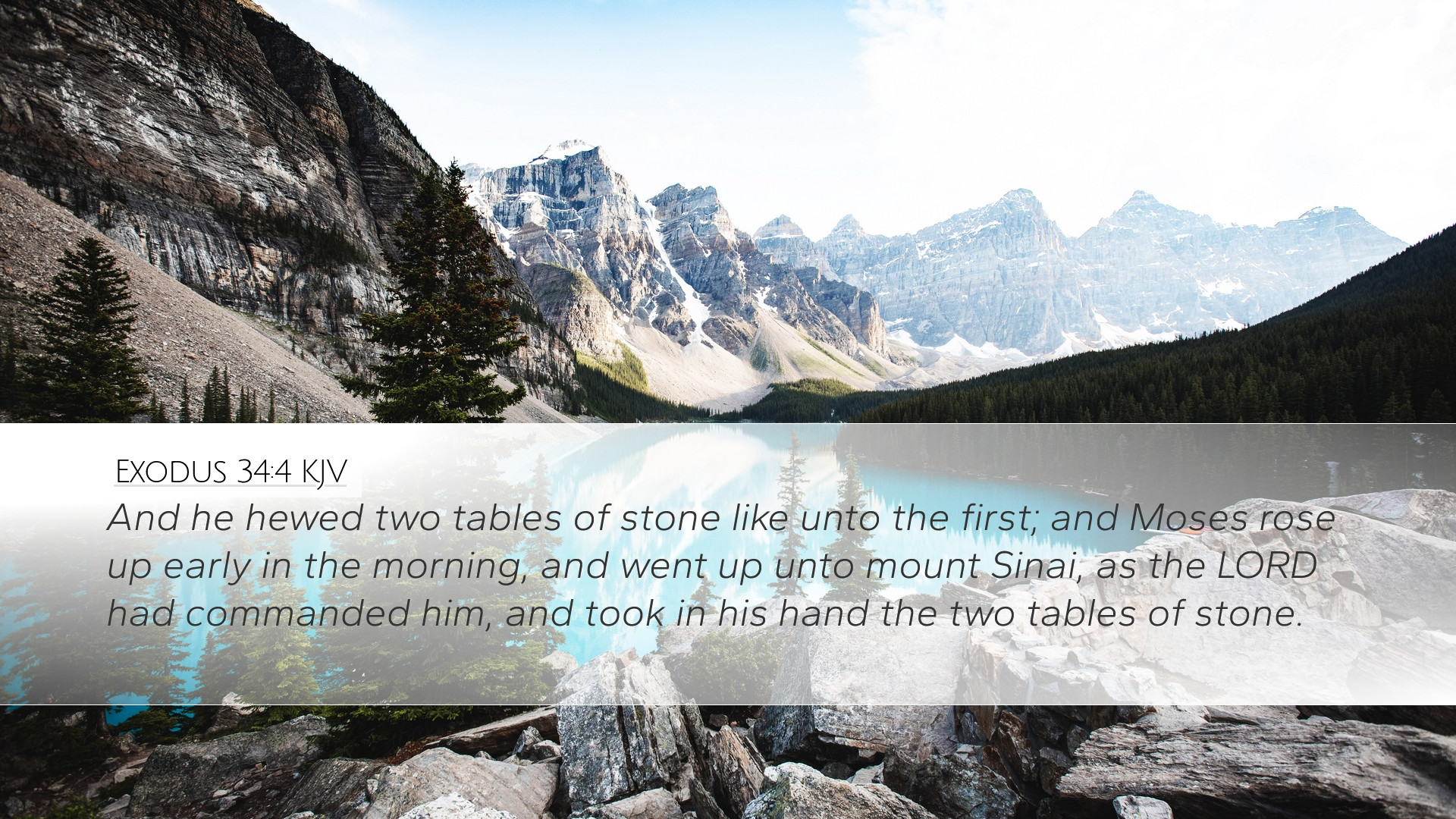Exodus 34:4 - Commentary
Verse Reference: Exodus 34:4
“So Moses cut two tablets of stone like the first ones. Then Moses rose early in the morning and went up Mount Sinai, as the Lord had commanded him; and he took in his hand the two tablets of stone.”
Introduction
This passage marks a pivotal moment in the Book of Exodus, where Moses returns to Mount Sinai to receive the tablets of the law a second time. This event occurs after the grievous sin of the Israelites in the worship of the golden calf. The renewed covenant parallels the first, emphasizing God’s mercy and the seriousness of sin.
The Significance of the Tablets
Moses’ act of cutting two new tablets signifies restoration and redemptive grace. Albert Barnes notes that these tablets represent God’s unchanging moral law, which remains relevant throughout time. Adam Clarke expands on this, indicating that Moses' willingness to prepare new tablets also reflects human cooperation in divine matters.
Moses’ Obedience
Moses rising early in the morning demonstrates his eagerness and dedication to fulfill God’s command. Matthew Henry highlights this as an example for believers, emphasizing diligence and promptitude in spiritual matters. The early rising also symbolizes the importance of seeking God’s presence first before undertaking any task.
The Context of Exodus 34
Understanding the context of Exodus 34 is essential for grasping its depth. After the catastrophic fall of Israel into idolatry, God invites Moses back to renew the covenant (Exodus 34:1-2). This act not only showcases God’s willingness to reconcile but also underscores the gravity of the sin committed by Israel.
God’s Mercy and Humanity’s Response
The necessity for a second pair of tablets illustrates God's mercy. Adam Clarke emphasizes that despite Israel's failures, God does not abandon them, highlighting the theme of forgiveness. This balance of mercy and judgment mirrors the larger narrative of Scripture, making the pastors’ task to convey this dual aspect in their teaching.
Theological Implications
The act of receiving the tablets again signifies not only a restoration but also a reaffirmation of God’s covenantal love. As Henry notes, this display of grace serves to encourage believers in their own spiritual journeys. Understanding God as a God of second chances can embolden pastors in their ministry.
- Moral Law: The tablets signify the enduring nature of God's moral law, which is immutable and universal.
- Covenantal Relationship: God invites Moses to renew the covenant, highlighting the dynamic relationship between divinity and humanity.
- Human Responsibility: Moses’ action illustrates the partnership role of humanity in God's divine plan.
Implications for Pastors and Theologians
This passage provides rich material for theological reflection. It emphasizes that even after rebellion, there is hope for restoration through genuine repentance and a return to covenant faithfulness. Pastors should communicate both the severity of sin and the immediacy of God's mercy to their congregations.
Conclusion
Exodus 34:4 encapsulates a critical lesson for believers about God’s character—His government over sin and His unending grace for a broken people. The legacy of teaching from this verse can shape our understanding of God's righteousness and mercy in contemporary contexts. The insights from traditional commentators enrich our comprehension and application of this scripture in modern theological discourse and practical ministry.


